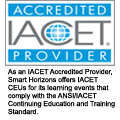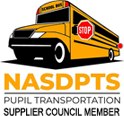Professional Development

Professional Development courses are also available for purchase individually.
Online training catalogs can be customized to include your choice of courses from the Professional Development, Campus Security, Food Service, or Transportation catalogs to meet your district, school, department, or organizational needs.
Contact us for details.
Start Your E-Learning Now!
New Employee Training (10 Hours)
- Sexual Harassment Awareness (1 Hour)
This course familiarizes employees with sexual harassment in the workplace. It discusses the legal definition of sexual harassment; recognition of, and understanding how to handle and prevent sexual harassment in the workplace; and the procedure for filing a sexual harassment complaint.
- Stress Management (1 Hour)
This course familiarizes employees with stress management techniques. It identifies the difference between reactions to real sources of stress and reactions to symbolic sources of stress. This course identifies the sources and significance of stress and effective methods for managing stress to improve personal health and job performance.
- Time Management (1 Hour)
This course discusses the principles of time management. It highlights time management myths, outlines the symptoms of poor time management, and provides methods for utilizing good time management practices.
- Bloodborne Pathogens (2 Hours)
This course describes bloodborne pathogens and defines associated terminology. It also discusses signs, symptoms, and treatments of the most commonly encountered bloodborne diseases, their methods of transmission, ways to prevent exposure to bloodborne pathogens, and beneficial actions following any
incidental exposure. - First Aid (2 Hours)
This lesson describes characteristics of a professional driver and discusses a variety of conditions that affect drivers and vehicle operation.
- Conflict Resolution for Adults (1 Hour)
This course defines conflict and conflict resolution. It identifies conflict sources and their components. It discusses workplace conflicts and identifies problem-solving tools and techniques used to resolve them. Communication skills required in managing and resolving conflict are addressed.
- Bullying Identification and Prevention (1 Hour)
This lesson discusses sound driving practices, including speed limits, following distances, passing, stopping, downshifting, and avoiding collisions.
- Identifying and Reporting Child Abuse (1 Hour)
This course discusses the different types of child abuse, indicators of abuse, key factors of reporting abuse, and actions to take with a child where abuse is suspected or reported.
Conflict Management (6 Hours)
- Bullying Identification and Prevention (1 Hour)
This course defines bullying and characteristics of bullies. It also details the effects of bullying from both a bully and victim perspective and discusses strategies to help prevent bullying.
- Childhood Anger and Anger Management (1 Hour)
This course defines anger, discusses its purpose, and identifies components of childhood anger. It also describes causes of childhood anger, discusses ways children respond, and addresses the adverse effects anger can have on children. In addition, the course identifies elements of an effective anger management program and provides effective anger management techniques and activities to use with children.
- Conflict Management for Children (1 Hour)
This course familiarizes employees with the definitions of conflict, conflict resolution, and conflict management; and identifies the origins of conflict and the basic beliefs about conflict and conflict management. It also discusses the strategies and steps for conflict resolution and identifies conflict management styles.
- Conflict Resolution for Adults (1 Hour)
This course defines conflict and conflict resolution. It identifies conflict sources and their components. It discusses workplace conflicts and identifies problem-solving tools and techniques used to resolve them. Communication skills required in managing and resolving conflict are addressed.
- Cross-Cultural Communication (2 Hours)
This course discusses the unique characteristics of communicating across cultural lines. It also discusses various cultural perspectives, and the skills and abilities needed to address them in the workplace and society.
Health (7 Hours)
- Medical Emergency Awareness (1 Hour)
This course discusses causes and symptoms of the following medical emergencies: anaphylaxis, choking, diabetic coma, seizures, and shock. It details appropriate first aid treatment.
- Physical Abuse Awareness (2 Hours)
This course discusses physical abuse and describes risk factors that contribute to the abuse of children. It details indicators of physical abuse and discusses physical, psychological, behavioral, and societal consequences. This course also provides strategies to prevent physical abuse and offers alternatives to physical punishment.
- Bloodborne Pathogens (2 Hours)
This course describes bloodborne pathogens and defines associated terminology. It also discusses signs, symptoms, and treatments of the most commonly encountered bloodborne diseases, their methods of transmission, ways to prevent exposure to bloodborne pathogens, and beneficial actions following any incidental exposure.
- HIV/AIDS Awareness (2 Hours)
This course describes historical background and general statistics of HIV/ AIDS. It describes HIV/AIDS methods of transmission, symptoms, and treatment
options. Techniques for prevention and legal issues pertaining to HIV/AIDS are also identified.
Safety (11 Hours)
- First Aid (2 Hours)
This lesson describes characteristics of a professional driver and discusses a variety of conditions that affect drivers and vehicle operation.
- First Aid: Guidelines and Precautions (1 Hour)
This course describes first aid guidelines and procedures for employees. It details general precautions to take, action plans, incident assessment techniques, and medications.
- First Aid: Physical Injuries and Emergencies (2 Hours)
This course discusses the symptoms and treatment of superficial or serious injuries and bites or stings caused by animals, reptiles, humans, or insects. It explains the categories of burns, as well as the appropriate response in the event of accidental poisoning.
- First Aid: Physiological Incidents and Emergencies (2 Hours)
This course familiarizes employees with the first aid techniques for general illnesses, respiratory incidents, temperature-related incidents, and fainting and seizures that may be observed. It details first aid procedures and guidelines for contacting an emergency contact and/or healthcare provider.
- Fire Safety Basics (3 Hours)
This course discusses basic fire chemistry, fire causes, and fire extinguisher identification/components. This course also discusses the identification, storage, and marking of hazardous material, as well as fire hazards and fire emergency assessment and safety guidelines.
- Identifying and Reporting Child Abuse (1 Hour)
This course discusses the different types of child abuse, indicators of abuse, key factors of reporting abuse, and actions to take with a child where abuse is suspected or reported.
Advanced Health & Safety (6 Hours)
- Prescription Drugs Misuse and Abuse (2 Hours)
This course familiarizes employees with problems arising from misuse, abuse, and diversion of controlled medications. It discusses the Controlled
Substance Act (CSA) of 1970, and Drug Enforcement Agency (DEA) policy for prescribing controlled substances. - Reading Prescription Labeling (1 Hour)
This course discusses the importance of reading and understanding prescription drug labeling. It describes label components and the significance of
each. It also defines federal label guidelines. - FDiabetes Awareness (1 Hour)
This course details the various types of diabetes and symptoms associated with each. It also addresses the special transportation needs of children with diabetes and treatment methods for diabetes-related conditions.
- Sexual Abuse Awareness (1 Hour)
This course discusses awareness of child sexual abuse in early childhood education. It defines child sexual abuse, victims, and perpetrators. It also identifies signs and types of child sexual abuse, attributes of both touching and nontouching abuse, prevention methods, steps to protect children from perpetrators, effects of sexual abuse, and treatment methods and strategies.
- Tolerance (1 Hour)
This course discusses teaching children tolerance and acceptance of others. It also includes activities for teaching tolerance and challenges associated with addressing prejudice.
Chemical Handling (5.5 Hours)
- General Safety Procedures (45 Min)
This course familiarizes employees with the basics of electrical safety, glassware & vacuum systems, spills and ladders.
- Chemical Procurement, Distribution, Storage, and Use (1 Hour)
This course familiarizes employees with receiving, distributing, storing, and using chemicals in a safe manner.
- Environmental Monitoring (15 Min)
This course familiarizes employees with environmental monitoring.
- Housekeeping, Maintenance, and Inspections (30 Min)
This course familiarizes employees with proper approach to housekeeping, maintenance, and inspections of chemical hygiene.
- Medical Program (15 Min)
This course familiarizes students with medical planning and information and procedures for reporting hazardous conditions.
- Personal Protective Equipment and Safety Equipment Module (1 Hour)
This course familiarizes employees with all aspects of safety equipment.
- Records and Reports (15 Min)
This course familiarizes employees with chemical hygiene plans and various lists, records, and reports.
- Signs and Labels (15 Min)
This course familiarizes employees with basics of signs and labels.
- Emergency Response (30 Min)
This course familiarizes employees with proper emergency response procedures.
- Information and Training (30 Min)
This course familiarizes employees with an overview of the various chemical hygiene reports.
- Waste Disposal (15 Min)
This course familiarizes employees with proper procedures and reports for disposing of chemical waste.



